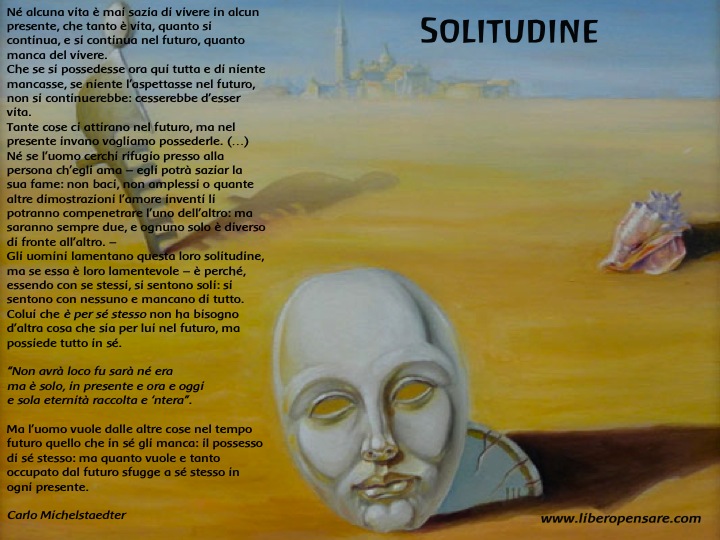
______________________________________________________________________________________
Né alcuna vita è mai sazia di vivere in alcun presente, che tanto è vita, quanto si continua, e si continua nel futuro, quanto manca del vivere. Che se si possedesse ora qui tutta e di niente mancasse, se niente l’aspettasse nel futuro, non si continuerebbe: cesserebbe d’esser vita. Tante cose ci attirano nel futuro, ma nel presente invano vogliamo possederle. (…)
Né se l’uomo cerchi rifugio presso alla persona ch’egli ama – egli potrà saziar la sua fame: non baci, non amplessi o quante altre dimostrazioni l’amore inventi li potranno compenetrare l’uno dell’altro: ma saranno sempre due, e ognuno solo è diverso di fronte all’altro. – Gli uomini lamentano questa loro solitudine, ma se essa è loro lamentevole – è perché, essendo con se stessi, si sentono soli: si sentono con nessuno e mancano di tutto. Colui che è per sé stesso non ha bisogno d’altra cosa che sia per lui nel futuro, ma possiede tutto in sé.
“Non avrà loco fu sarà né era ma è solo, in presente e ora e oggi e sola eternità raccolta e ‘ntera”.
Ma l’uomo vuole dalle altre cose nel tempo futuro quello che in sé gli manca: il possesso di sé stesso: ma quanto vuole e tanto occupato dal futuro sfugge a sé stesso in ogni presente.
Carlo Michelstaedter
* * *
Nor is any life ever satisfied to live in any present, for insofar as it is life it continues, and it continues into the future to the degree that it lacks life. If it were to possess itself completely here and now and be in want of nothing—if it awaited nothing in the future—it would not continue: it would cease to be life. So many things attract us in the future, but in vain do we want to possess them in the present. (…)
Nor can a man seeking refuge in the persona he loves satisfy his hunger: neither kisses nor embraces nor any other demonstrations invented by love can interpenetrate one with the other: they will always be two, each alone and distinct. Men lament this solitude, but if they find it lamentable it is because being with themselves they feel alone: they feel themselves to be with no one, in want of everything. He who is for himself (mevnei) has no need of what would be for him (mevnoi aujtovn) in a future time but instead possesses all within himself.
“Has been,” “shall be,” and “was” will take place no more,
But “is” only in the present, and “now” and “today,” And only the whole of eternity assembled”
But man wants from other things in a future time what he lacks in himself: the possession of his own self, and as he wants and is busied so with the future he escapes himself in every present.
Carlo Michelstaedter



